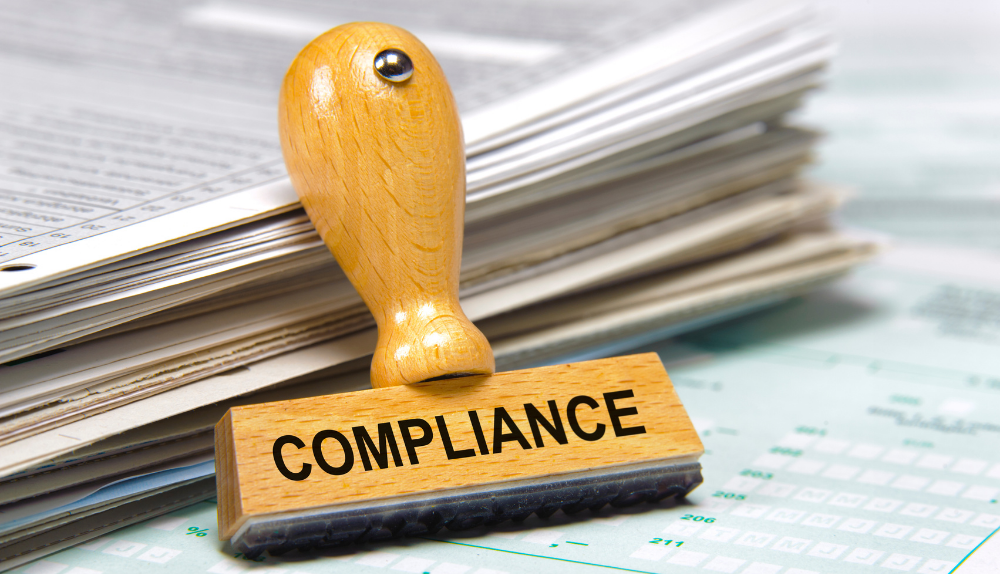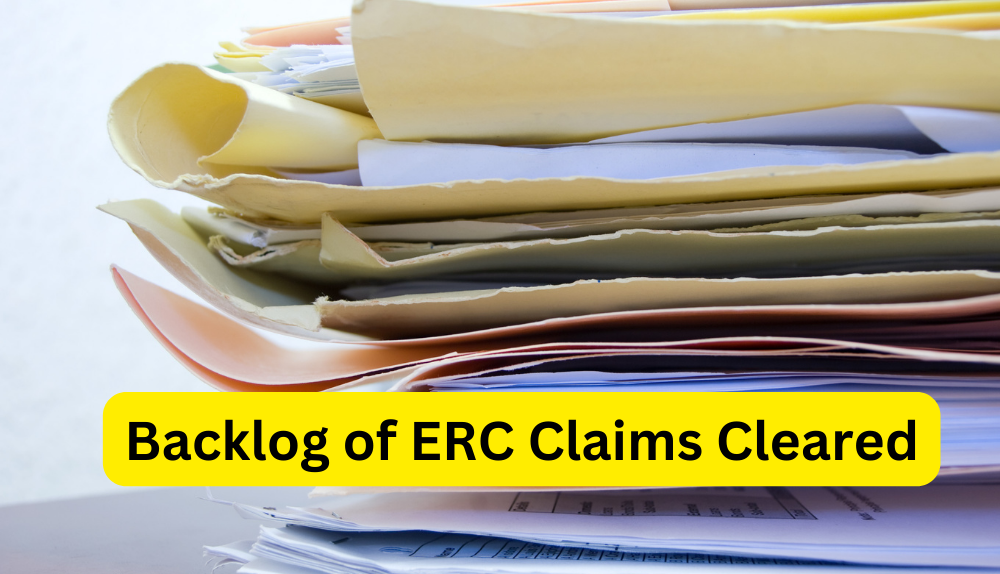Great news for taxpayers in the United States! The Internal Revenue Service (IRS) has made significant progress in resolving a large number of Employee Retention Credit (ERC) claims that were waiting for approval. The IRS Commissioner, Danny Werfel, has announced that they have successfully cleared the ERC claims backlog, bringing relief to businesses and individuals across the country.
Now that this major accomplishment has been achieved, the IRS is entering a new phase. They will be carefully reviewing all submissions to make sure they are legitimate and accurate. At the same time, they want to warn people about companies that may try to deceive them with aggressive marketing tactics.
This progress is a big step forward in tackling fraud in ERC claims and making the IRS more efficient and transparent. It also shows their commitment to being accountable to the public and earning their trust.
IRS Takes Aim at Fraud in ERC Claims
After successfully clearing the backlog of valid Employee Retention Credit (ERC) claims, the Internal Revenue Service (IRS) has turned its focus towards tackling the issue of fraud in the program. Commissioner Danny Werfel addressed tax professionals at a special roundtable session in Atlanta, emphasizing the agency’s commitment to intensify compliance efforts and implement additional procedures to deal with deceptive practices.
Strengthening Compliance Measures
With the backlog of ERC claims resolved, the IRS is now channeling its resources into enhancing compliance measures to ensure that only eligible and genuine claims are approved. The agency has recognized the significance of preventing fraud to safeguard taxpayer dollars and maintain the integrity of the program. By strengthening its compliance procedures, the IRS aims to create a more transparent and fair process for assessing claims.

Increased Audit Activity
Commissioner Werfel highlighted the IRS’s proactive approach to combat fraud by significantly increasing audit activity on both promoters and businesses filing dubious ERC claims. By subjecting these claims to in-depth scrutiny, the IRS seeks to identify and rectify any erroneous or misleading information. This rigorous audit process acts as a deterrent against potential fraudsters and reinforces the importance of adhering to the program’s guidelines.
Criminal Investigations
In addition to heightened audit efforts, the IRS has also ramped up its criminal investigation work concerning aggressive ERC claims. The agency is determined to hold individuals or entities engaging in fraudulent practices accountable for their actions. By conducting thorough investigations, the IRS aims to identify and prosecute those attempting to exploit the program for personal gain.

Collaborating with Tax Professionals
Recognizing the essential role tax professionals play in assisting businesses and individuals with ERC claims, Commissioner Werfel actively engaged with a group of tax professionals dealing with the repercussions of aggressive ERC claims. Through open dialogue and collaboration, the IRS seeks to gain valuable insights from these professionals to further refine their compliance strategies and ensure a more effective and efficient process for identifying and preventing fraudulent claims.
Warning Against Aggressive Marketing
In his address, Commissioner Werfel also reiterated the IRS’s warning to taxpayers about aggressive marketing tactics employed by some entities. These entities may attempt to lure unsuspecting businesses into filing dubious ERC claims, promising substantial benefits. By raising awareness about these deceptive practices, the IRS aims to protect taxpayers from falling victim to fraud and ensure that claims are based on accurate and legitimate information.
The IRS’s commitment to combatting fraud in ERC claims demonstrates its dedication to maintaining fairness and transparency within the program. Through increased audit and criminal investigation activities, strengthened compliance measures, and collaboration with tax professionals, the agency is taking proactive steps to protect taxpayer interests and uphold the integrity of the Employee Retention Credit program.
Declining Percentage of Legitimate ERC Claims
As the United States gradually moves away from the pandemic’s peak, the IRS is encountering a concerning trend: a decline in the percentage of legitimate Employee Retention Credit (ERC) claims. Commissioner Danny Werfel addressed this issue at the IRS Nationwide Tax Forum in Atlanta, acknowledging that the agency is grappling with a growing number of questionable claims being submitted. This worrisome development has raised concerns about the accuracy and authenticity of some claims, necessitating a focused approach to tackle the challenges.

Misleading Marketing and Questionable Claims
One of the primary challenges facing the IRS is the proliferation of misleading marketing tactics used by promoters to encourage businesses to apply for ERC claims. These deceptive practices can lead to a surge in questionable claims that lack the necessary validity and adherence to program guidelines. Such misleading marketing attempts can confuse businesses and individuals, potentially leading to incorrect or fraudulent submissions.
Intensifying Compliance Work
In response to the surge in questionable claims, the IRS has recognized the urgency of intensifying its compliance efforts. By bolstering its compliance work, the agency aims to meticulously scrutinize each claim to distinguish between valid and dubious submissions. The objective is to prevent improper claims from slipping through the cracks and to ensure that only deserving recipients receive the benefits of the ERC program.
Handling the Complexity of Claims
The ERC program’s complexity poses another significant challenge for the IRS. Navigating the complexities of the program can be daunting for taxpayers, leading to errors or misunderstandings in their claims. Ensuring that taxpayers understand the eligibility criteria and the correct procedures for claiming credit is crucial to minimize inaccurate submissions.
Resource Constraints
Like any government agency, the IRS operates within resource constraints. Addressing the mounting number of ERC claims and dealing with potential fraudulent activities demands considerable resources, both human and technological. The IRS must carefully manage its resources to effectively combat fraud and uphold the integrity of the program while continuing to handle other essential tax-related tasks.
Ensuring Fairness and Accuracy
Amidst the challenges posed by questionable claims and misleading marketing, the IRS must strike a delicate balance between efficiently processing legitimate claims and thoroughly investigating potential fraud. Ensuring fairness and accuracy throughout the process is paramount to maintaining public trust and confidence in the ERC program.
Growing Concerns About Potential Fraud
With the Employee Retention Credit (ERC) program attracting significant attention, the IRS is increasingly concerned about potential fraud and scams targeting taxpayers. The surge in false and misleading public advertisements has raised alarm bells, prompting the agency to take decisive action to safeguard taxpayer interests and the integrity of the program.
Trained Auditors Focused on High-Risk Claims
To address the mounting concerns, the IRS has deployed trained auditors who specialize in examining ERC claims that pose the greatest risk of being fraudulent. By focusing on high-risk claims, the agency aims to identify and rectify any inaccuracies or attempts to exploit the program. This proactive approach enhances the IRS’s ability to distinguish between valid claims and those with questionable authenticity.
IRS Criminal Investigation Division on the Trail of Fraudulent Promoters
The IRS Criminal Investigation division is playing a pivotal role in the fight against potential fraud in the ERC program. This specialized unit is actively investigating and tracking down promoters of fraudulent claims. By holding these individuals accountable for their deceptive practices, the IRS aims to deter others from engaging in similar scams.
Consequences of Improperly Claiming the ERC
The IRS is keen to remind taxpayers of the severe consequences associated with improperly claiming the ERC. If a claim is found to be invalid or fraudulent, the taxpayer may be required to pay back the credit along with potential penalties and interest. For businesses or tax-exempt groups, this could lead to a significant financial setback, as they may find themselves in a worse cash position than if they had never claimed the credit at all. As such, avoiding scams and ensuring the legitimacy of claims is of utmost importance.
Safeguarding Taxpayer Interests
In light of the increased risk of potential fraud, the IRS is steadfast in its commitment to protecting taxpayer interests. By proactively training auditors, conducting criminal investigations, and warning against deceptive practices, the agency seeks to maintain the integrity of the ERC program and instill confidence in the American public.
Warning Signs of Aggressive ERC Marketing
Recognizing warning signs of aggressive Employee Retention Credit (ERC) marketing is crucial for taxpayers to protect themselves from potential scams and deceptive practices. Here are some key indicators to watch out for:
Unrealistic Promises
Aggressive marketers may make extravagant promises, such as guaranteeing large amounts of ERC benefits, without thoroughly assessing a business’s eligibility or specific circumstances. Beware of anyone offering “surefire” ways to secure the credit without proper documentation.
Pressure Tactics
Scammers may use high-pressure tactics to quickly push businesses into filing ERC claims without allowing adequate time for careful consideration or verifying eligibility. Legitimate tax professionals typically provide ample time for consultation and evaluation.
Upfront Fees
Be cautious of promoters who demand upfront fees or require payment before providing services related to ERC claims. Reputable tax professionals often charge fees based on a percentage of the credit obtained or upon successful claim approval.
Lack of Documentation Requests
Aggressive marketers may downplay the importance of providing supporting documentation or accurate financial records for the ERC claim. A legitimate claim requires proper documentation to support the eligibility of the credit.
Phishing Attempts
Scammers might impersonate IRS officials or use fake websites to collect sensitive information from taxpayers. The IRS never initiates communication via email or social media and will not request personal information through these channels.
Misrepresentation of Eligibility
Beware of promoters who claim that businesses automatically qualify for the ERC without proper evaluation. Eligibility for credit depends on various factors, including business size, operations, and revenue decline during the pandemic.
Lack of Transparency
Aggressive marketers may avoid providing clear information about their services, fees, or success rates. Trustworthy tax professionals are open about their processes and willingly share their credentials and track records.
Deadline to File ERC Claims
As per the current law, businesses have the opportunity to file claims for the Employee Retention Credit (ERC) until April 15, 2025. This deadline allows eligible businesses to access the credit for a considerable period after the enactment of the law. However, IRS Commissioner Danny Werfel has expressed concerns about the future implications of this deadline, indicating that it might be subject to change in subsequent legislation or regulations.
As such, businesses are advised to stay informed about any updates or extensions to the ERC claim deadline that may arise in the future. Being aware of the deadline is crucial for businesses to ensure they don’t miss the opportunity to claim the credit and maximize the benefits available to them during this period.
Final Words
In conclusion, the Employee Retention Credit (ERC) serves as a significant lifeline for businesses, providing much-needed financial support during challenging times. The IRS’s dedication to addressing the backlog of valid ERC claims and intensifying efforts to combat potential fraud demonstrates its commitment to upholding fairness and transparency within the program.
However, caution must be exercised against misleading marketing and aggressive tactics, as businesses and taxpayers must remain vigilant in safeguarding themselves from potential scams. By understanding the warning signs and staying informed about the ERC claim deadline, businesses can navigate the process with confidence and secure the credit they rightfully deserve.
As the landscape continues to evolve, the IRS’s ongoing diligence and collaboration with tax professionals will be instrumental in fostering a trustworthy and effective ERC program for the benefit of all.
Frequently Asked Questions (FAQs)
Who is eligible to claim the ERC?
Eligibility for the ERC depends on various factors, including business size, revenue decline, and operations during the pandemic. Generally, businesses with significant revenue losses or those subject to full or partial government-mandated shutdowns may qualify.
How do I calculate the ERC for my business?
The ERC amount is calculated based on the number of full-time employees retained and the amount of qualified wages paid to them. Eligible businesses can claim a percentage of qualified wages, subject to certain limits, for each employee retained during the designated period.
Can I claim the ERC retroactively for past periods?
Yes, under certain circumstances, businesses can amend their tax returns to claim the ERC for eligible periods in the past. The IRS provides guidelines and procedures for amending returns to claim credit.
Are tax-exempt organizations eligible for the ERC?
Yes, tax-exempt organizations, including nonprofits, are eligible for the ERC. They can claim the credit against their payroll taxes or seek refunds if they don’t have any payroll tax liability.


